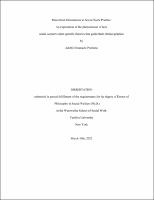Please use this identifier to cite or link to this item:
https://hdl.handle.net/20.500.12202/8201| Title: | Theoretical Orientations to Social Work Practice: An exploration of the phenomenon of how social workers select specific theories that guide their clinical practice |
| Authors: | Mason, Susan Pilkay, Stefanie Glassman, Urania Profumo, Adolfo Emanuele |
| Keywords: | Clinical social work phenomenology social work education theoretical orientation |
| Issue Date: | 10-Mar-2022 |
| Publisher: | ProQuest Dissertations & Theses Global |
| Citation: | Profumo, A.E. (2022, March 10). Theoretical Orientations to Social Work Practice: An exploration of the phenomenon of how social workers select specific theories that guide their clinical practice. (Publication No. 29208943) [Doctoral dissertation, PhD, Yeshiva University]. ProQuest Dissertations & Theses Global. |
| Series/Report no.: | ProQuest Dissertations & Theses Global;Publication No. 29208943 |
| Abstract: | Research has shown that a clinician’s theoretical orientation influences how they are perceived by as well as how they engage with their client, and consequently, are important for client treatment outcomes. However, the literature regarding what inspires a practitioner’s choice of theoretical orientation is scant. Hence, this study examined the factors clinicians perceive as having influenced their choice (and change) of theoretical orientation. In a qualitative, phenomenological research study, 38 members of a professional social work society were surveyed. Participants reported strong influences of a variety of factors based in their social work studies, outside studies, their own therapeutic experiences, mentors, and other factors outside of education. The themes with the most support from participants were the influence of life experiences, class content in their social work studies, their own psychodynamic therapeutic experiences, as well as mentors. In addition, half of the sample previously changed their theoretical orientation. The most frequently mentioned factors influencing clinicians’ change of theoretical orientation were their experience with patients, life experiences as well as continuing education programs and clinical growth. Building on these findings, this work proposes that a guided process should be integrated into social work curricula to help clinicians identify the theoretical orientation(s) that best suit their work. Finally, this study concludes with a discussion of the implications and contributions of this work for social work education, social work practice, and policy. |
| Description: | Doctoral dissertation, PhD / Open access |
| URI: | https://hdl.handle.net/20.500.12202/8201 https://ezproxy.yu.edu/login?url=https://www.proquest.com/dissertations-theses/theoretical-orientations-social-work-practice/docview/2676608407/se-2?accountid=15178 |
| Appears in Collections: | Wurzweiler School of Social Work: Dissertations |
Files in This Item:
| File | Description | Size | Format | |
|---|---|---|---|---|
| A. Profumo Dissertation Update 23May2022R.pdf | 691.07 kB | Adobe PDF |  View/Open |
This item is licensed under a Creative Commons License

